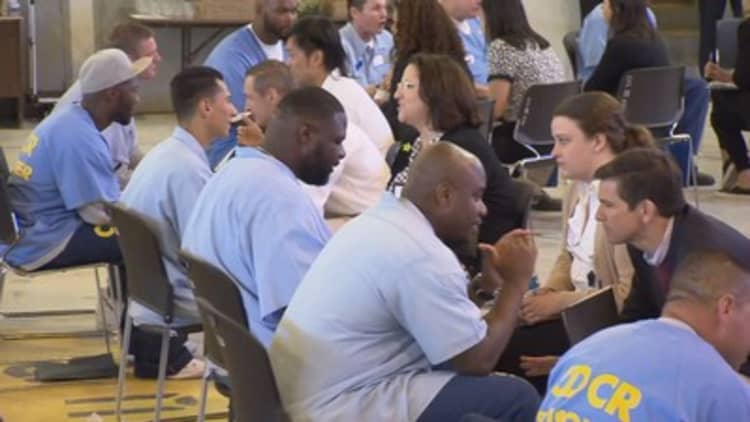
On one morning late this spring, dozens of inmates at Solano State Prison in Northern California scurried around the penitentiary's gym, ready for a life-changing day.
They were about to pitch their business ideas to a squad of Silicon Valley's elite tech leaders and venture capitalists.
The prisoners were part of an entrepreneurship program by a nonprofit company called Defy Ventures. The inmates, or entrepreneurs-in-training (EIT for short), take courses for an average of six months that teach them how to turn their small business ideas into reality.
Some of the classes teach them about business, some about life; they range from MBA-style instruction to character and parent education. Defy's program has created 166 businesses and 350 jobs for graduates.
All are geared to build self-esteem and awareness in a group of people that Catherine Hoke, Defy Ventures' founder, told CNBC's "On the Money" are often forgotten. Hoke's personal stake in the company comes from her own rise and fall: She had been a successful venture capitalist but several years ago, she lost her job and had to start over.
"I founded Defy as my second chance to give second chances," said Hoke. "I'm the chief operating officer for Defy Ventures, and I work with these people to tell them why second chances are so important."
Hoke's message seems to resonate with EITs like Wayne Burleson, who said he entered prison in 1997 for murder at 20 years old.
"Prison worked for me," Burleson said. "It got my attention and it caused me to look at the bigger issues of life. I think long-term. I never thought long term before. I didn't see my life existing past 25."
The EITs at Solano State engaged in a boisterous welcome of their visitors, a show Hoke said was meant to break the ice and alleviate any tension between the prisoners and volunteers. The two groups paired off in a speed-dating format to discuss the business ideas of the budding entrepreneurs. In one pairing, an EIT describes his business idea for an Uber-style app for barbers to a volunteer who actually does work for Uber.
"It's got to get going," said the inmate, "and make some money."
There's a whole holistic side of it, like building the relationship with your family, building the relationship with yourself. The exercises that I went through in that program, you can't beat it. It was just so real.Coss Martefitness studio founder
Some of the ice-breaking exercises are revealing and deeply personal, underscoring the vast gulf between the worlds that divide volunteers and EITs. Many at Solano had either a mother or father — or both — who were also incarcerated.
"In our country, one of the statistics that makes me the saddest is that incarceration is a generational legacy that is handed down from one to another," Hoke said. "Seventy percent of the children of the incarcerated end up going behind bars."
The ice-breakers between volunteers and EITs "create empathy," Hoke told CNBC. "When they can appreciate and respect their differences, but still bond in their humanity, and realize yes, we all make mistakes, then great things can come of that."
One of Defy's biggest success stories is Coss Marte, a convicted drug kingpin who at one time made $2 million dollars a year running one of the New York City's largest drug rings.
Marte, who lost 70 pounds while in prison after a doctor told him his weight could be life-threatening, decided to turn his weight loss into a business opportunity. He founded ConBody, a fitness studio that now has nearly 1,400 members, and just opened a location at Saks Fifth Avenue in Manhattan.
Marte has already hired 15 graduates of Defy's programs, something he told CNBC he hoped was just the beginning.
"My dream one day is to create a direct pipeline from the inside out so that we can hire directly from the program," he said. "We feel like we could disrupt the fitness industry" — much like Defy has "disrupted" his own life.
"There's a whole holistic side of it, like building the relationship with your family, building the relationship with yourself," Marte added. "The exercises that I went through in that program, you can't beat it. It was just so real."
Correction: This story was revised to remove an incorrect assertion about Hoke's background. She did not serve time in prison.
"On the Money" airs on CNBC Saturdays at 5:30 am ET, or check listings for air times in local markets.



